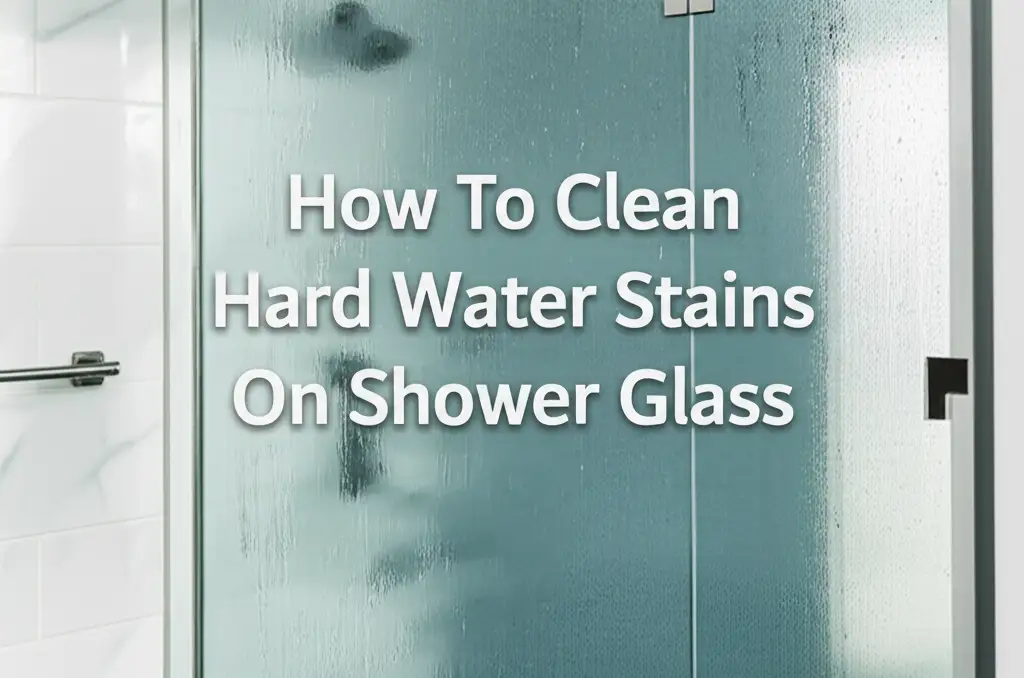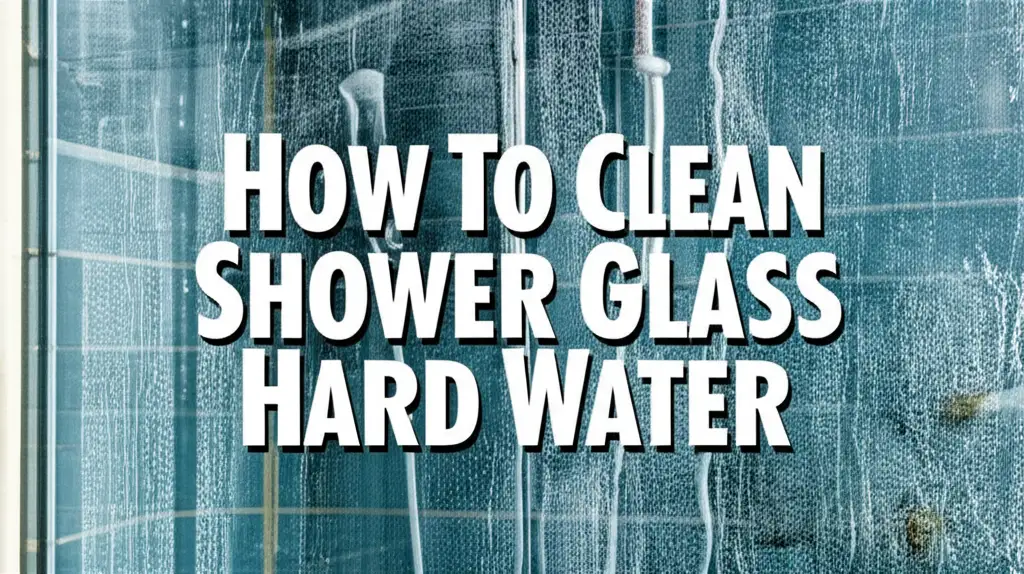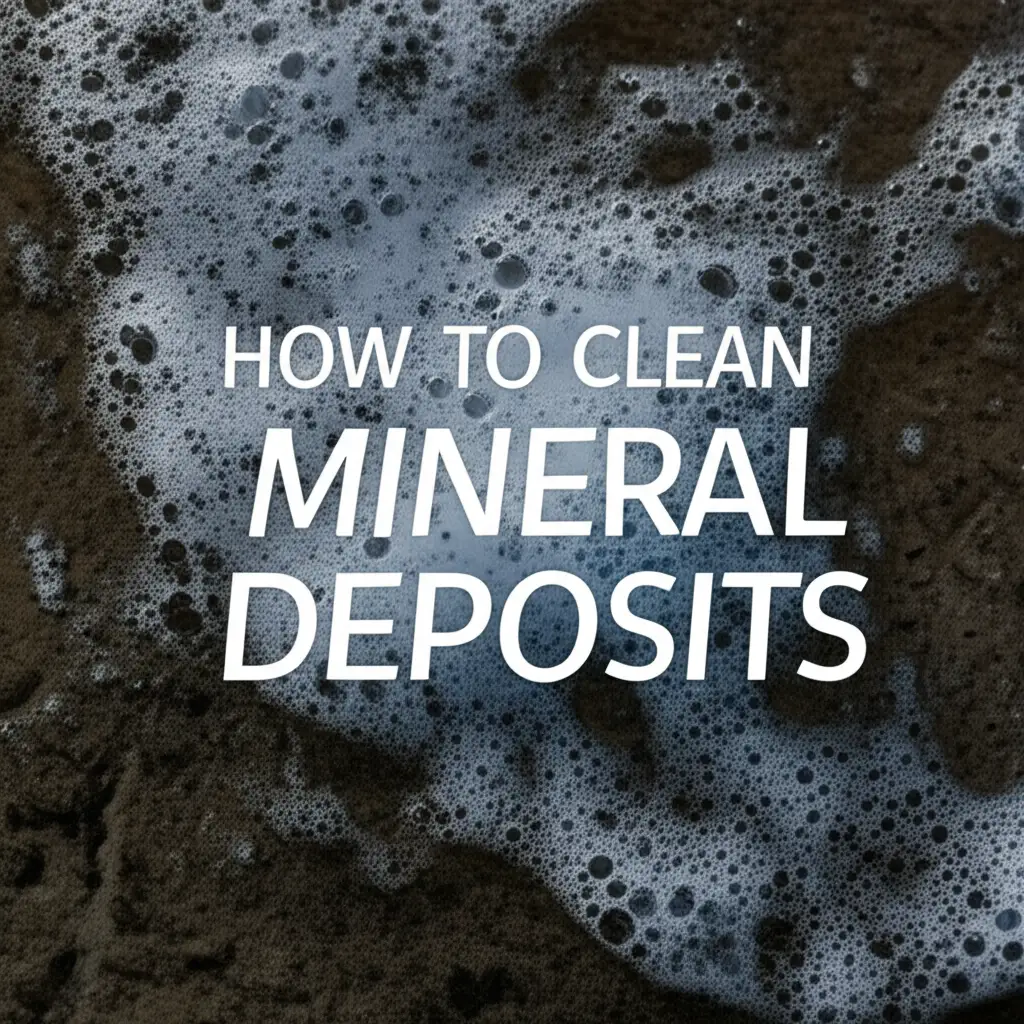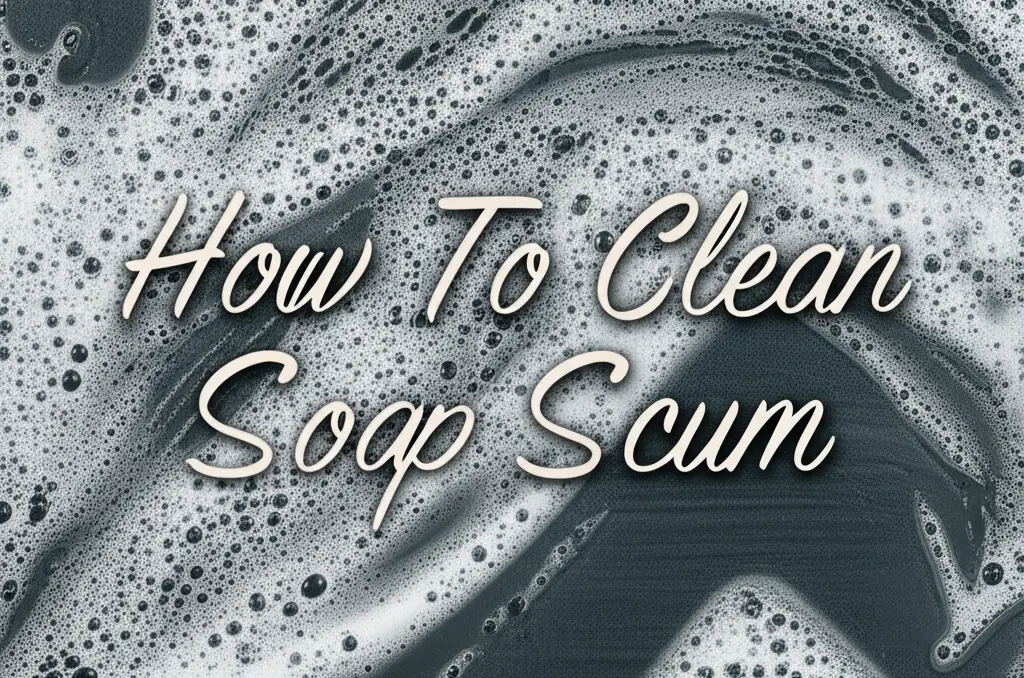· Home Cleaning · 15 min read
How To Clean Hard Water Stains On Shower Glass

Restore Shine: Clean Hard Water Stains on Shower Glass
Introduction
Stepping into your shower should feel refreshing. Instead, many of us face a view obscured by cloudy, stubborn hard water stains. These mineral deposits can make even the cleanest bathroom feel dirty. I know the frustration of scrubbing without seeing results. Learning how to clean hard water stains on shower glass effectively is a game-changer.
This comprehensive guide will help you reclaim your sparkling shower. We will explore what causes these pesky stains and gather the right tools for the job. You will discover powerful natural remedies and effective commercial cleaners. We will also dive into deep cleaning methods for tough spots. Finally, I will share essential tips to prevent future build-up, ensuring your shower glass stays clear and bright for longer.
Takeaway
- Understand hard water stains to choose the best cleaning method.
- Use natural or commercial solutions safely and effectively.
- Apply deep cleaning techniques for stubborn mineral deposits.
- Prevent future stains with daily habits and protective coatings.
Quick Answer
To clean hard water stains on shower glass, use acidic solutions like vinegar or lemon juice for natural removal, or specialized commercial cleaners for tougher deposits. Regular application of a squeegee and protective coatings helps prevent new stains.
Understanding Hard Water Stains and Their Impact on Shower Glass
Hard water stains are a common household nuisance. They appear as milky white, chalky residue on surfaces. This film often dulls the appearance of your shower glass. Knowing what causes these stains helps us choose the best way to clean them.
The impact on shower glass goes beyond just looks. Over time, these mineral deposits can etch into the glass. This makes the surface rough and even harder to clean. It can permanently damage the clear finish. Addressing these stains promptly protects your shower investment.
What Causes Hard Water Stains?
Hard water contains high levels of dissolved minerals. The most common minerals are calcium and magnesium. When this water evaporates on your shower glass, these minerals are left behind. They dry onto the surface, creating visible stains.
Every time water splashes on your shower door, a new layer of minerals settles. This process builds up over time. The more mineral content in your water, the faster and thicker the stains form. This is why some homes experience more severe hard water issues than others.
Why Are They So Stubborn?
Hard water stains are stubborn because minerals bond tightly to the glass. These mineral bonds can be difficult to break. Simple scrubbing with water often does not work. The minerals need an acidic solution to dissolve them.
Over time, these layers of minerals can harden. They become calcified, forming a strong crust. This crust resists many standard cleaners. If left untreated, the minerals can also etch the glass surface itself. This etching makes the glass cloudy and rough. It creates tiny pits where new minerals can easily stick.
Essential Supplies and Safety Precautions for Cleaning Shower Glass
Before you begin tackling those hard water stains, gather your supplies. Having everything ready makes the cleaning process smoother. It also helps you work more efficiently. I always prepare my tools first.
Safety is also a top priority during any cleaning project. Some cleaning products can be harsh. Protecting yourself helps prevent irritation or injury. I make sure to put on my safety gear.
Gathering Your Cleaning Arsenal
You will need several key items to effectively clean hard water stains on shower glass. A spray bottle is essential for applying solutions. Microfiber cloths are perfect for scrubbing and buffing. They are gentle on glass and leave no lint.
A sturdy squeegee is also very helpful, especially for daily maintenance. Consider a non-abrasive scrub brush or sponge for tougher spots. For really stubborn stains, a razor blade scraper might be needed. Just use it with extreme care.
Prioritizing Safety During Cleaning
Always work in a well-ventilated area. Open windows or turn on your bathroom fan. This helps to clear any fumes from cleaning products. Good ventilation protects your respiratory system.
Wear rubber gloves to protect your hands from harsh chemicals. Eye protection, like safety glasses, is also recommended. This guards against splashes or sprays. Never mix different cleaning products unless specifically directed. Mixing chemicals can create dangerous fumes.
Natural and Eco-Friendly Methods for Removing Shower Glass Stains
Many people prefer to use natural cleaning solutions. These methods are often safer for your family and the environment. They can be very effective against hard water stains. I often start with these options first.
These eco-friendly choices utilize common household ingredients. They can dissolve mineral deposits without harsh chemicals. It feels good to clean your home using simple, natural items. You might already have these items in your pantry.
The Power of Vinegar and Baking Soda
White vinegar is a cleaning powerhouse. Its acidity breaks down mineral deposits. Fill a spray bottle with undiluted white vinegar. Spray it generously onto the stained shower glass. Make sure the glass is completely wet.
Let the vinegar sit for at least 15-30 minutes. For very tough stains, let it sit for several hours or even overnight. Then, mix baking soda with a little water to form a paste. Apply this paste to a non-abrasive scrub pad. Gently scrub the glass in circular motions. The abrasive action of baking soda helps remove loosened minerals. Rinse thoroughly with water and wipe dry with a microfiber cloth.
Lemon Juice for Light Stains
Lemon juice offers a milder, more pleasant-smelling alternative. Its natural acidity is effective for lighter hard water stains. It also leaves behind a fresh, clean scent. This is a good option for routine cleaning or less severe build-up.
Cut a lemon in half. You can also use bottled lemon juice. Rub the cut lemon directly onto the stained areas. Alternatively, spray concentrated lemon juice onto the glass. Allow it to sit for about 10-15 minutes. Wipe the surface clean with a damp cloth. Then, buff with a dry microfiber towel.
Cream of Tartar Paste for Tough Spots
Cream of tartar is a lesser-known but effective cleaner. It contains mild acid that can tackle stubborn stains. It works particularly well on older, more set-in hard water spots. This method can be a good next step if vinegar alone is not enough.
Mix equal parts cream of tartar and water to create a thick paste. You can also use hydrogen peroxide instead of water for extra power. Apply this paste directly to the stained areas. Let the paste sit on the glass for 30 minutes to an hour. Use a soft sponge or cloth to scrub the area. Rinse the glass completely with warm water. Dry with a clean, lint-free towel.
Commercial Cleaners and Specialized Products for Stubborn Hard Water
Sometimes, natural methods need a little help. Commercial cleaners are formulated to tackle tough mineral deposits. They often contain stronger acids or chelating agents. These ingredients specifically target calcium and magnesium.
Using specialized tools can also make a big difference. These tools help apply pressure and scrub away residue. They can speed up the cleaning process for very stubborn stains. It is important to choose the right products and tools.
Choosing the Right Commercial Cleaner
Look for commercial cleaners designed specifically for hard water stains or limescale. Many products are available on the market. Read the labels carefully to ensure they are safe for shower glass. Some cleaners are highly acidic and might require extra precautions.
Avoid cleaners that contain harsh abrasives. These can scratch your glass. Spray-on formulas are convenient for general use. For very heavy build-up, gel or foam cleaners might cling better to vertical surfaces. Always follow the manufacturer’s instructions for application and dwell time.
Using Specialized Tools and Scrubbers
Beyond cloths and sponges, some specialized tools can enhance cleaning. A non-scratch scrubbing pad designed for glass is useful. These pads offer more abrasive power without damaging the surface. Some have a rougher texture for deeper cleaning.
For extremely stubborn, calcified deposits, a razor blade scraper can be used. Hold the scraper at a shallow angle, almost flat against the glass. Work slowly and carefully to avoid scratching the glass. Always keep the blade wet with cleaner. This helps it glide smoothly. A sturdy squeegee with a fresh rubber blade is also great for clearing water and cleaner residue.
Deep Cleaning Techniques for Heavily Stained Shower Glass
When hard water stains have accumulated over a long time, standard cleaning might not be enough. Heavily stained shower glass requires a more intensive approach. Deep cleaning combines different techniques for maximum effect. I find that layering treatments often works best for these situations.
This process targets the most stubborn mineral buildup. It aims to restore your shower glass to its original clarity. Patience and persistence are key here. Do not get discouraged by the initial appearance of the stains.
Layering Treatments for Maximum Impact
For severe hard water stains, combine methods. Start by thoroughly wetting the glass with white vinegar. Let it soak for at least an hour, or even overnight. The vinegar will start to break down the outer layers of mineral deposits.
After the vinegar has worked, apply a paste of baking soda and vinegar. Or, use a commercial hard water stain remover. Apply it directly over the vinegar-treated area. Let this second layer sit for the recommended time. The combination of the acid softening and the cleaner’s action can dissolve tough layers. This layered approach allows each product to work on the softened minerals.
Steaming and Scraping Methods
Heat can help soften stubborn mineral deposits. Use a steam cleaner if you have one. Direct the steam onto the stained glass. The heat helps to loosen the mineral bonds. Work in small sections to keep the area hot.
Immediately after steaming, use a non-scratch scrub pad. You can also use a razor blade scraper. Carefully scrape away the softened deposits. Hold the scraper at a very low angle, almost flat. Ensure the glass is always wet to prevent scratching. This method is effective for removing thick, crusty build-up. Always be extremely gentle with the scraper.
Professional Assistance When Needed
Sometimes, the stains are just too deeply ingrained. If you have tried multiple methods without success, professional help is an option. Professional cleaners have access to stronger chemicals and specialized equipment. They also have experience dealing with severe hard water damage.
They can often restore badly etched or heavily stained glass. They might use industrial-strength acids or polishing tools. If your glass looks permanently cloudy, consider a professional consultation. This can save you time and effort. It also ensures the job is done correctly without damaging your shower.
Preventing Future Hard Water Stains on Shower Glass
Cleaning hard water stains is important. However, preventing them from forming is even better. Regular maintenance can save you a lot of effort in the long run. Small daily habits make a big difference. I always stress prevention because it keeps my shower looking new.
Investing a little time each day keeps the glass sparkling. It stops mineral deposits from building up into stubborn stains. This section will guide you on how to maintain a spotless shower.
Daily Habits for a Spotless Shower
The single most effective prevention tip is daily maintenance. After every shower, squeegee the glass. A good squeegee removes most of the water. This prevents minerals from drying onto the surface. Keep the squeegee handy inside your shower.
After squeegeeing, quickly wipe down the glass with a microfiber cloth. This removes any remaining water droplets. Towel drying ensures the glass is completely dry. This simple two-step process takes less than a minute. It is the best defense against hard water stains.
Applying Protective Coatings
Consider applying a protective coating to your shower glass. Products like Rain-X for showers create a hydrophobic barrier. This barrier makes water bead up and roll off the glass. It greatly reduces the chance of mineral deposits forming.
These coatings also make the glass easier to clean in the future. They repel soap scum and other residues too. Follow the product instructions for application. Reapply the coating every few months for continuous protection. This adds an invisible shield to your shower glass.
Regular Maintenance Schedule
Beyond daily squeegeeing, establish a regular cleaning schedule. A quick weekly wipe-down with a vinegar solution helps. This removes any minor mineral accumulation before it becomes a problem. Mix equal parts water and white vinegar in a spray bottle.
Spray the glass and wipe it clean. A monthly deep clean is also beneficial. Use your preferred natural or commercial cleaner. This ensures no hidden spots are missed. Consistency is key to preventing tough stains. Your shower glass will thank you for the extra care.
Troubleshooting Common Shower Glass Cleaning Challenges
Even with the best techniques, challenges can arise. Sometimes, hard water stains are not the only problem. You might encounter etched glass or persistent soap scum. Addressing these specific issues requires targeted approaches. I have faced these challenges myself.
Knowing how to handle these common problems saves frustration. It helps you achieve truly clean and clear shower glass. Let’s look at some specific scenarios.
Dealing with Etched Glass
Etched glass is a permanent form of damage. It occurs when hard water minerals penetrate the glass surface over time. The glass develops a cloudy, dull appearance that cannot be simply wiped away. Unfortunately, once glass is etched, it is very difficult to restore its original clarity.
Specialized glass polishing compounds can sometimes improve the appearance. These compounds work by very gently abrading the surface. However, this process is labor-intensive and might require professional help. The best approach for etched glass is prevention. Once it happens, focus on keeping it as clean as possible and preventing further etching.
Removing Soap Scum Alongside Hard Water
Hard water stains often appear alongside soap scum. Soap scum is a sticky, white film formed when soap reacts with minerals in hard water. It clings tightly to surfaces. Many hard water cleaners also help dissolve soap scum. However, some products are specifically formulated for soap scum removal.
For combination stains, I suggest a two-step approach. First, tackle the hard water minerals with an acidic cleaner like vinegar. Let it sit and loosen the deposits. Then, use a general bathroom cleaner or a baking soda paste to scrub away the remaining soap scum. A magic eraser can also be surprisingly effective on soap scum.
Odor Control During Cleaning
Some cleaning products, especially vinegar, can leave a strong odor. While effective, the smell can be unpleasant. Ensure excellent ventilation when using these products. Open windows wide and turn on the bathroom fan. This helps dissipate the fumes quickly.
After cleaning, rinse the shower thoroughly with water. You can also spray a solution of water with a few drops of essential oil. Lemon or peppermint oils can leave a fresh scent. For natural odor absorption, place a bowl of activated charcoal in the bathroom after cleaning. This helps neutralize lingering smells.
Frequently Asked Questions About Cleaning Shower Glass
How often should I clean my shower glass to prevent hard water stains?
You should squeegee and wipe down your shower glass after every use. For deeper cleaning, a quick weekly spray with a vinegar solution is ideal. A more thorough clean, using a stronger product, can be done monthly. This consistent effort prevents mineral build-up.
Can I use bleach to clean hard water stains on shower glass?
No, bleach is not effective for hard water stains. Hard water stains are mineral deposits, which require an acid to dissolve them. Bleach is an oxidizer and does not break down minerals. Bleach can also be dangerous if mixed with other cleaners.
What if my shower glass is etched from hard water?
Etched glass has permanent damage where minerals have pitted the surface. It is very hard to fix completely. You can try specialized glass polishing compounds to improve clarity slightly. However, often the best approach is to prevent further etching and ensure proper future maintenance.
Are there any permanent solutions to prevent hard water stains?
There is no truly “permanent” solution that removes all effort. However, installing a whole-house water softener is the most effective long-term solution. This system removes hard water minerals before they reach your shower. Regular squeegeeing and applying protective coatings also greatly minimize stains.
Is it safe to mix different cleaning products for hard water stains?
No, never mix different cleaning products. Mixing certain chemicals, like bleach and ammonia-based cleaners, can create dangerous, toxic fumes. Stick to one cleaner at a time. If you switch products, always rinse the surface completely between applications.
How do I know if I have hard water?
You likely have hard water if you notice white, chalky residue on fixtures, sinks, or shower glass. Soap also struggles to lather properly. You might also see dingy-looking clothes after laundry. You can buy a simple test kit to confirm your water’s hardness level.
Conclusion
Cleaning hard water stains on shower glass does not have to be a daunting task. You now have a comprehensive toolkit at your disposal. From understanding what causes these stubborn deposits to applying powerful natural and commercial cleaning methods, you are well-equipped. Remember the importance of deep cleaning for severe cases.
The real secret to a continuously sparkling shower lies in prevention. Simple daily habits, such as squeegeeing and drying, make a huge difference. Applying protective coatings provides an extra layer of defense. By consistently applying these tips, your shower glass will stay clear and bright. Enjoy your gleaming, spotless shower, a true testament to your cleaning efforts!
- hard water stains
- shower glass cleaning
- limescale removal
- bathroom cleaning
- home maintenance




